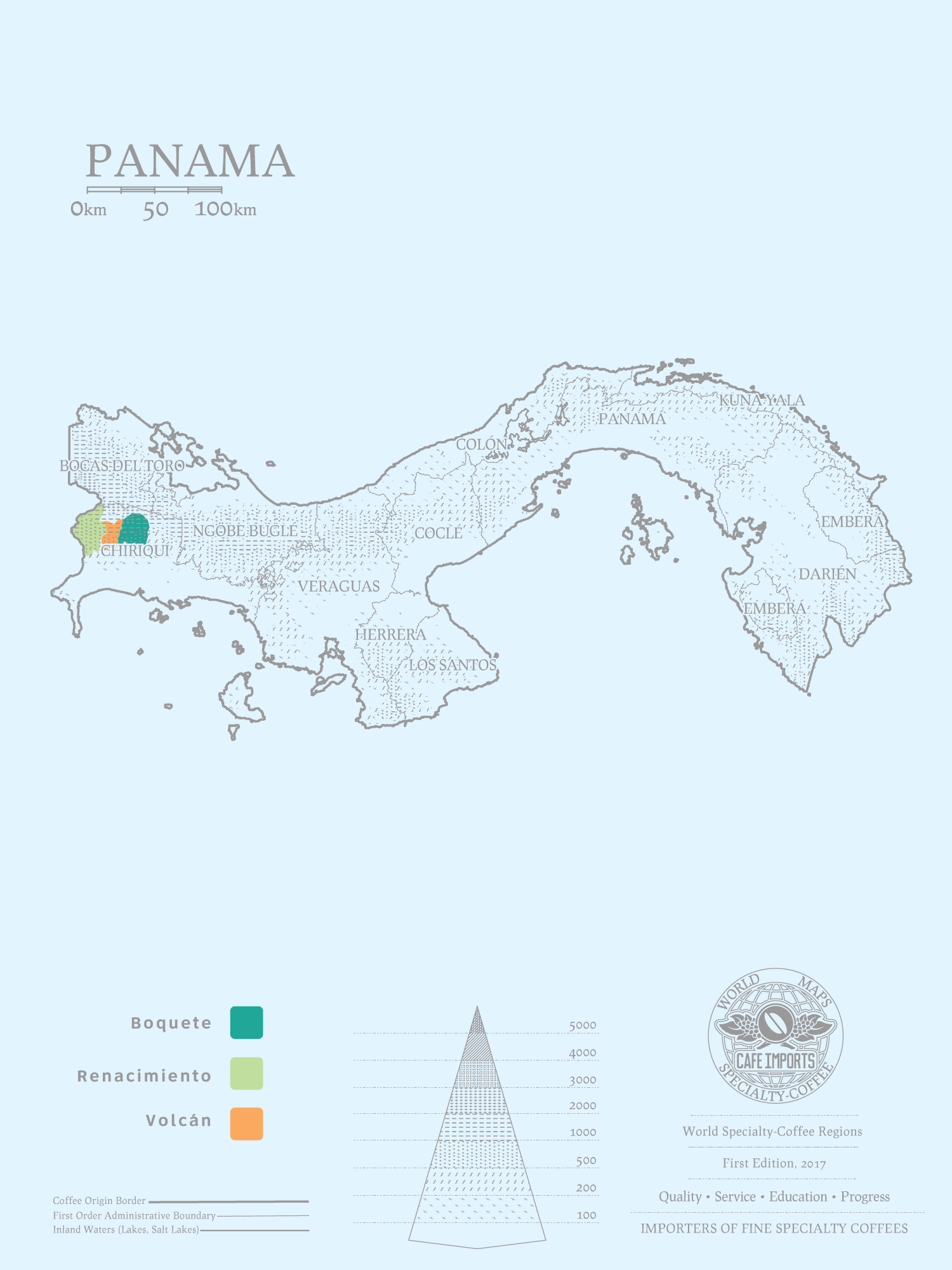Panama fine coffee bean producing area introduction, rose summer seed is from Panama?
In the 1990s, rose summer was only a hybrid that could improve the resistance of coffee crops to leaf rust in the eyes of Panamanian coffee farmers, with outstanding flavor and fruit size. But in the best Panama in 2004, the key to winning the title at Emerald Manor is this humble rose summer coffee. Its outstanding citrus mixed with white flowers shocked the coffee market at that time.
Today, Panama's success in the coffee market is largely due to the success of summer roses, which has received special attention and pursuit from coffee practitioners all over the world. How did Panama become an ideal producer of boutique coffee? Qianjie is coming to share the knowledge about Panamanian coffee today.
Panama is located in the southern tip of Central and South America, neighboring Colombia, Costa Rica, with the Panama Canal connecting the Atlantic and Pacific Ocean, is the dividing line between North and South America. The terrain of the whole country is undulating and the valleys are vertical and horizontal. In addition to the north and south coastal plains, most of them are mountainous. Due to the geographical location close to the equator, it belongs to the tropical maritime climate, humid during the day, cool at night, and the annual average temperature is 23-27C °. The whole year is divided into two seasons: drought and rain, with an average annual precipitation of 1500m3 2500mm.

Because of the excellent climatic conditions, Panama has attracted a large number of European and American intellectuals, and coffee has been developed as a necessary drink in its daily life and work. The first coffee estate bought in Pocket opened the beginning of the cultivation of Panamanian coffee, but the coffee during this period was not well-known and produced little. Panamanian coffee grew vertically after it was introduced from Ethiopia in the 1990s to coincide with the leaf rust of coffee, until the Emerald Manor became popular because of Rose Summer in 2004.
The main producing areas are as follows:
Pocket (Boquet)
Located between 1400 and 1900 meters above sea level, Pokuit is a town in Chiriki province, located between the border of Panama and Costa Rica, near the famous volcano BARU, the microclimate and volcanic soil make Pokquet very suitable for growing coffee, while the famous Emerald Manor and Alida Manor have estates here.
Walken (volcan)
When it comes to Panamanian coffee, most of the boutique coffee producing areas that are familiar to the public come from Boquete, but in recent years, coffee from Volcan has gradually emerged in the boutique market. At the same time, a considerable number of estates have entered the best Panama competition (Best of Panama) and even won the championship. Generally speaking, the average annual rainfall in Walken is less than that in Bocquette. At the same time, the geographical environment located to the west of the Baru volcano also gives coffee a stronger dried fruit flavor, sweetness and aroma than the Boguet region.
Walken coffee producing area is mainly planted at an altitude of 2000-3000m. In the early days, most of the cash crops such as fruits and vegetables were grown in Walken, and only a few farmers grew coffee, among which the pioneer of coffee cultivation in Walken belonged to the Hartman family, which was well-known in Panama.
RENACIMIENTO coffee producing area
Renacimiento producing area is a producing area in Chiriqui province, which is mainly planted at an altitude of 1100-1500m. Bordering Costa Rica. The area itself is relatively small, so it is not the main feature of Panamanian coffee beans.
Important Notice :
前街咖啡 FrontStreet Coffee has moved to new addredd:
FrontStreet Coffee Address: 315,Donghua East Road,GuangZhou
Tel:020 38364473
- Prev

Which brand of Huakui coffee beans tastes best? What is the difference between the characteristics and origin of Huakui coffee beans and Rosa coffee beans?
What's the difference between Sakuran and Rosa coffee beans? This will be introduced one by one. Sakui's popularity is due to the fact that Li Jianfei, then the runner-up in China in the 2017 World Coffee Brewing Competition, took part in the competition with new champion beans, breaking the situation in which players only use roses and summer beans in the brewing competition. make this bean
- Next

Did Panama Emerald grow its coffee beans in the first place? How is it graded?
The microclimate and volcanic soil of Panama's Baru volcano attract many coffee plantations to the area, as does Panama's Emerald Estate. Emerald Manor is located on the tip of Baru Volcano, and its owners, the Peterson family, bought Emerald Manor in Poquet in 1964, but did not buy it then.
Related
- Guji coffee producing area of Guji, Ethiopia: Humbela, Shakiso, Wulaga
- What is the most expensive variety of Qiloso in BOP multi-variety group?
- How to store the coffee beans bought home?
- Why are Yemeni coffee beans so rare now?
- Ethiopian Sidamo all Red Fruit Sun Sun Santa Vini Coffee beans
- SOE is mostly sour? What does it mean? Is it a single bean? what's the difference between it and Italian blending?
- Is Italian coffee beans suitable for making hand-brewed coffee?
- How to choose coffee beans when making cold coffee? What kind of coffee beans are suitable for making cold coffee?
- Just entered the pit to make coffee, what kind of coffee beans should be chosen?
- Can only Japan buy real Blue Mountain Coffee? What are authentic Jamaican Blue Mountain coffee beans?

